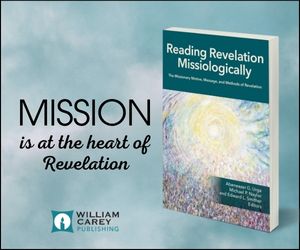EMQ » April–June 2023 » Volume 59 Issue 2

Summary: In the current era of missions, caring for creation often holds little strategic value. However, this was not always the case. In the 1600s and 1700s, evangelicals had a more integrated approach. A careful examination of Scripture reveals this integration has its roots in biblical missiology.
By David Bookless
Is creation care a novelty in terms of mission? Is it simply a response to the contemporary crises of climate change, biodiversity loss, pollution, and waste? And, whilst few would argue that a changing environment provides a critical context for mission in the twenty-first century, should it be part of the content of mission, too?
Creation Care is Integral
The modern missionary movement is often traced back to William Carey, ‘the father of modern missions,’[1] and his 1792 essay, “An Enquiry into the Obligations of Christians to Use Means for the Conversion of the Heathens.” Despite the title of his essay, Carey was interested in more than conversions. He became a Bible translator, educationalist (founding schools and Serampore University), social reformer (campaigning to abolish the practice of ‘sati’ whereby a widow were burned alive with her husband’s body) and, significantly, a leading figure in Indian botany.
Carey established the Agri-Horticultural Society of India in 1820 (thirty years prior to its British equivalent) and edited (partially re-writing) William Roxburgh’s major three volume Flora Indica; or Descriptions of Indian Plants. He had several plants named after him, including an indigenous eucalyptus, Careya herbacea and the Saul tree or Wild Guava, Careya aborea.
According to Vishal Mangalwadi, Carey’s motivation for botany “came from his belief that God has made man responsible for the earth.”[2] His ecological interests were not the hobby of an English eccentric, but a practical outworking of his evangelical faith. His evangelicalism made him passionate about evangelism, but equally it convinced him that all truth was God’s truth. Thus social reform, education, and scientific investigation of God’s creation all stemmed from and pointed to the lordship of Jesus Christ.
Carey was not unusual amongst early evangelicals. It was the norm rather than the exception, in those pre-Darwin days, to see scientific enquiry as thinking God’s thoughts after him. The natural world displayed The Wisdom of God Manifested in the Works of the Creation, to quote the title of John Ray’s seminal 1691 book. It was evangelicals (mainly members of the Clapham Sect, including William Wilberforce) who campaigned for legislation against animal cruelty because these were “God’s creatures,” and according to secular social historians, “an essential role [in early animal welfare] was played by Puritans, Dissenters, Quakers, and Evangelicals.”[3]
The Bible and the lordship of Christ inspired the earliest evangelicals to see what we now term creation care as an integral element of their worldview and mission. It was not until nineteenth- and twentieth-century evangelicalism that we see a retreat from evangelical engagement with the world and a limiting of mission to conversions and spiritual issues.
Creation Care is Biblical
So, what wisdom does the Bible give regarding a missiological understanding of creation care?
It begins by establishing that mission begins with God and with God’s creation of all that exists. It is a fundamental mistake, and indeed a form of idolatry, to make mission in our own image. Mission is not only about us – people – and our need for a Saviour. God’s mission (the Missio Dei) begins in the heart of the Trinity, where the generative love between Father, Son, and Spirit could not be contained but exploded into the creative expression that we know as material reality.
The first missional act was the Father, through the Son, speaking out “Let there be light.” What flowed is beautifully described in Genesis 1–2, Psalm 104, Proverbs 8, and elsewhere as God created and celebrated a very good world, where wisdom “was filled with delight day after day, rejoicing always in his presence, rejoicing in his whole world and delighting in mankind’ (Proverbs 8:30–31).
It is critical to recognise that mission begins with a good creation, and that sinful humanity comes later. This enables us to see our fellow human beings as “fearfully and wonderfully made” (Psalm 139:14) and thus worthy of respect and honour, not merely miserable sinners. It lays foundations for the worldview of William Carey, that the world is worth caring for: that social reform, education, and the careful study of God’s creation are worthwhile pursuits in their own right, not simply means to an evangelistic end.
It is because we have overlooked the biblical truth that mission begins with creation, that we have missed something else obvious and important. The first Great Commission is not found in Matthew 28. It is found in Genesis 1:26–28 and 2:15, and it is all about creation care! Man and woman are created in God’s image so that they may rule over their fellow creatures, the fish, birds, and animals (1:26), and that they might “work and take care of” the garden of God’s creation (2:15). Note that the very purpose of being made in the image of God is integrally linked to our commission towards other creatures and the earthly garden.
Sometimes Christians have misinterpreted the Genesis 1:26–28 language of dominion and subdue as a license to exploit creation for our selfish ends. Nothing could be further from God’s plan. Our missional mandate is to reflect God’s image, in other words to fulfil God’s intent, in enabling creation to flourish to God’s glory.
The language of Genesis 2:15, where the Hebrew for work and take care of can be translated as serve and preserve is a helpful commentary on Genesis 1:26–28. Our mission is to be God’s gardeners: to work with the material creation, to lead and serve amongst our fellow creatures, with the ultimate aim that “the earth will be filled with the knowledge of the glory of the Lord as the waters cover the sea” (Habakkuk 2:14, Isaiah 11:9).
To call this the cultural mandate is to miss the point. Its focus is not human culture but biological flourishing. It is primarily an ecological mandate. If the mission of God begins with creation, then the mission of all creation is to worship and glorify God and, in the light of the New Testament, to glorify Jesus by and for whom all things were made (Colossians 1:16). Within that, our primary mission as image-bearers is to enable creation to flourish as God intended and so bring glory to Christ.
Creation Care is Gospel Integrated
This may seem a long way from today’s popular evangelical understandings of mission, but it is both biblical and transformative. It is on these foundations that the tragic story of human sin and the need for a saviour are built. It does not weaken or water-down the gospel of Jesus’ death and resurrection, or the need for evangelism and discipleship. In fact, many involved in creation care report that their experiences demonstrate it strengthens them.
When A Rocha (www.arocha.org) began forty years ago with a single project in Portugal, it was seen by many as irrelevant or even biblically unsound. Why study and conserve birds and flowers when people are dying without Jesus? Yet, the premise of that question is false. We study and conserve God’s world because that is the first Great Commission.[4]
It became clear something significant was happening as A Rocha’s work developed in Portugal in the 1980s and later spread around the world. People of many backgrounds were attracted to an expression of Christian faith, often lived in community, and demonstrated by integrated care for people and planet undergirded by Bible study and prayer. As evangelist Rob Frost later explained it, “When Christians take the earth seriously, people take the gospel seriously.”[5]
A Rocha now has national organisations in 20+ countries and a growing group of friends (linked organisations and projects) in many others. The work on the ground is incredibly diverse. Examples include tackling human-elephant conflict in India, eradicating introduced pests to protect native wildlife in New Zealand, sustainable community development in Ugandan slums, reforesting the dry coastal deserts of Peru, seeking to save the globally important Atewa forest in Ghana from the threat of bauxite mining, and urban food-growing in multi-ethnic London, UK. The tie-cord that links such diverse projects is, quite simply, the Genesis Great Commission and the lordship of Christ.
Creation Care is Jesus-Centred
Whereas the Genesis Great Commission is given to all humanity, and thus provides common ground for partnership with those of all faiths and none, the confession that Jesus is Lord is clearly unique to Christianity. Our missiology has tended to limit the lordship of Christ to individual souls, yet that is deeply reductionist and unbiblical. Jesus himself defined the gospel as the good news of the kingdom of God. God’s kingly rule, ‘on earth as it is in heaven’ is therefore what Jesus-centred mission must be all about. Anything less than an integral approach to mission – seeking God’s kingdom rule in every dimension of society and creation – is ultimately a denial of the lordship of Christ.
To understand the full scope of Jesus’ saving work, we need to go back to the garden. When Adam and Eve sinned, chaos and curse were introduced into every relationship. Our evangelical missiology has often focused only on the breakdown of humanity’s relationship with God. Yet, Genesis is clear that sin’s cancerous spread affected inter-human relationships (marriage rows and murder soon follow), and the very earth from which Adam was formed was now cursed because of his sin.
How would God deal with the endemic problem of sin? Looking at the strategies of many missions, you’d be forgiven for thinking God’s answer would be to rescue a chosen few from the sinking ship of planet Earth. Yet that’s not what God did or does today! He came in judgement and salvation first through the flood and Noah’s ark.
Yet, disturbingly, God did not just save a few humans. Instead, he seemed peculiarly concerned that animal species of every kind should be included on the ark. And then, through the first biblical covenant in Genesis 9, he included not only Noah and his family but also “every living creature on the earth” (repeated again and again in the Hebrew text). God has a covenant relationship with nonhuman creatures and even (Genesis 9:13) with the earth itself.
As we continue through the Old Testament, we find this concern for the land and its creatures is woven into the Mosaic law and the life of the people of Israel. Later, as God’s people repeatedly broke the covenant and suffered exile the prophets reminded them that their relationship with God and the land and its creatures were inextricably bound together, as they had been in Eden.
Thus, Jeremiah, Isaiah, and Hosea all describe how human sin not only offends God but causes animals and birds to die, and the land itself to be in mourning. Yet, the prophetic vision looks forward to a day beyond disaster when God will send his servant, a shepherd king, to bring judgement and salvation once more. Once again, their visions of a future era of shalom involve restored relationships, not only between human souls and God, but throughout the whole of creation.
This is the back story to Jesus’ proclamation of the kingdom of God and, indeed, to his Great Commission in Matthew 28:19, to “make disciples of all nations.” Jesus came not only to save individual humans. He came because it was God’s missional purpose, “through him to reconcile to himself all things, whether things on earth or things in heaven, by making peace through his blood, shed on the cross” (Colossians 1:20).
In Jesus, all the relationships broken in Eden are mended, or finally will be when he returns “to restore everything, as he promised long ago through his holy prophets” (Acts 3:21). It is important to note that the Greek word universally used by the New Testament for new creation, new heavens and new earth, new Jerusalem is not neos (brand new) but kainos (renewed, restored, redeemed … recycled!).
Mission without Creation Care is not Fully Mission
To put it simply, mission without creation care is mission without the full lordship of Christ. The Bible’s narrative sweep, from Genesis to Revelation, is of God’s missional purposes for humanity within God’s bigger purposes for the whole created order. That Christ-centred, kingdom-seeking vision for all creation must be at the heart of our missiology. In no way does this reduce the urgency of evangelism. After all, creation is “waiting for the children of God to be revealed” as it also waits to “be liberated from its bondage to decay and brought into the freedom and glory of the children of God” (Romans 8:19, 21).
God has chosen us, image-bearers, fallen sinners, saved by grace, to be his agents of reconciliation. The practical implications are enormous and call for a reorientation in our mission strategies, our consumption and use of creation’s resources, our lifestyles, and, most of all, in our vision of the scope of mission. In the words of the well-known hymn:
“Joy to the world, the Lord is come
Let Earth receive her King
Let every heart prepare Him room
And Heaven and nature sing.”

Dave Bookless (dave.bookless@arocha.org), PhD, is ordained and the director of theology for A Rocha International and a Lausanne catalyst for creation care. Born in India to missionary parents, Dave now lives in multi-ethnic Southall, London with his wife, Anne. His passion is bringing the whole gospel to the whole world. He has written widely, including writing the book Planetwise: Dare to Care for God’s Word. He has lectured in more than 40 countries across six continents.
[1] Justo L. Gonzalez, The Story of Christianity Vol. 2: The Reformation to the Present Day (Zondervan, 2010), 419.
[2] Vishal and Ruth Mangalwadi, The Legacy of William Carey: A Model for the Transformation of a Culture (Wheaton, IL: Crossway Books, 1993), 22.
[3] Keith Thomas, Man and the Natural World: Changing Attitudes in England 1500–1800 (London: Allen Lane, 1983), 180.
[4] Jesus also tells us to study birds and flowers (Matthew 6:25–30)!
[5] Rob Frost, conversation with author, 2006.
EMQ, Volume 59, Issue 2. Copyright © 2023 by Missio Nexus. All rights reserved. Not to be reproduced or copied in any form without written permission from Missio Nexus. Email: EMQ@MissioNexus.org.









Responses